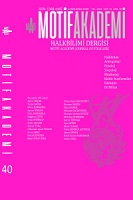ŞECERE-İ TERÂKİME’YE PSİKOSOYBİLİM BAĞLAMINDA BİR YAKLAŞIM
AN APPROACH TO ŞECERE-İ TERÂKİME IN CONTEXT OF PSYCHOGENEALOGICAL
Author(s): Ayşe SezerSubject(s): Psychology, Clinical psychology, Sociology of Culture, 17th Century
Published by: Motif Halk Oyunları Eğitim ve Öğretim Vakfı
Keywords: Psychogenealogy; Şecere-i Terâkime; Oğuznamecilik; Oghuz Khan; tradition;
Summary/Abstract: Ebulgâzi Bahadır Han is a Turkish ruler who lived between 1603-1663 during the turbulent times of the Central Asian Khanates, who came from the Chingis lineage and served as the Khiva khanate for twenty-one years. The main importance of Abulgâzi Bahadır Han for us is that he wrote two important genealogies / Oğuzname. The first of these, the Şecere-i Terâkime, was written in 1660; Şecere-i Türk was left unfinished after the death of Ebulgâzi in 1663 and was completed by his son. The source of the Şecere-i Terâkime is mainly composed of the Persian Oghuzname in Reşididdin's Câmiü't Tevârih and about twenty narrations collected from among the Turkmen. Although these collected rumors are sources of history and folklore, they also allow the lineage / gene to be interpreted in the context of psychological. Psychogenealogy science is created as a result of the long and meticulous work of Anne Ancelin Schützenberger; researching the backgrounds of individuals that cannot find the source of positive or negative psychological issues in their own lives; It is a clinical method that enables traumas to be brought to light over generations. For what purpose the Turkish society, which has created a rich genealogy tradition, wrote these genealogies/Oğuznames, and then what many elements in these genealogies mean have been tried to be examined in the psychogenealogy context; In this study, it is aimed to interpret the Oğuzname tradition and genealogy culture in Turkish society, both with the psychogenealogy method and in the context of bodylore, based on the work called Şecere-i Terâkime. In Şecere-i Terâkime, it has been seen that the purpose of writing the work and the explanation of the lineage one by one allow for the psychological interpretation of history. It has been determined that Şecere-i Terâkime is highly open to interpretation in terms of reviewing many good or bad events and finding ties between people.
Journal: Motif Akademi Halkbilimi Dergisi
- Issue Year: 15/2022
- Issue No: 40
- Page Range: 1392-1409
- Page Count: 18
- Language: Turkish

